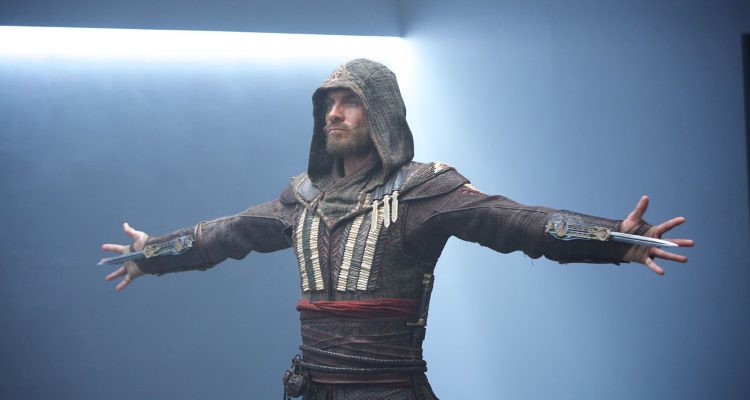On the set of Assassin’s Creed, a lone eagle soars over an expanse of desert in Almería, Southern Spain. On the ground beneath it, a convoy of 15th-century carriages thunder down a dusty road. Towards the rear of the carriages, two hooded figures navigate their way forward, taking out the drivers one by one, in as silent and efficient a way as possible.
For anyone who’s played one of these games by Ubisoft, the set of Assassin’s Creed will feel instantly familiar. For those who aren’t familiar with the game, Assassin’s Creed has players command a highly skilled Assassin through numerous periods of world history. This silent yet deadly Assassin runs across rooftops and executes threats to humanity with hidden blades concealed in their bracers.

First released in 2007, there has been a major Assassin’s Creed game published almost annually ever since as well as a string of spin-offs. It has become one of the flagship video game franchises in the world, selling more than 96 million copies worldwide. From the moment the series released its first teaser trailer, fans have been crying out for a feature film to bring the vision of the games to reality—or at least as close as cinema can bring the game’s premise to life.
It was five years ago that the Ubisoft Motion Pictures team and Jean de Rivieres met with Ubisoft’s Yves Guillemot to discuss the potential of Assassin’s Creed for big screen treatment. It was essential, Guillemot insisted that the DNA of the games be respected in any attempt to translate them to another medium. And that meant finding the right actor to play the lead Assassin in a film.
“Even before talking to potential screenwriters and studio partners, we felt we needed an iconic actor to play our Assassin,” says de Riveres. “Michael Fassbender was the obvious choice, he brought both mainstream success and an independent touch to the project. We only went to Michael, no other actor was ever up for the role.”

Fassbender, who is well known to audiences for roles in films like X-Men: Days of Future Past and Steve Jobs, responded immediately to the central Assassin’s Creed idea that through technology we can tap the genetic memories of our ancestors and relive their experiences across history.
“The idea that we hold in us the experiences, mistakes, and memories of our ancestors was really fascinating,” notes Fassbender. “I thought it was a really cool scientific theory that seemed very plausible.”
Fassbender plays Aguilar de Nehra, an Assassin who lived in Spain during the Spanish Inquisition that began in 1478. But for much of the movie he plays a modern-day character, Callum Lynch. Cal is a death row convict who is spared the lethal injection by a company called Abstergo. They offer him a chance to experience the life of his ancestor using a machine called the Animus that taps into his genetic memory.

“It feels like two different movies in a way,” says Fassbender. “Aguilar is definitely part of a family, and he believes in the Creed. Cal is somebody who’s much more of a drifter, having been in and out of correctional facilities for most of his life. He doesn’t believe in much.”
Finding a director with vision enough to realize both of these time periods was a big challenge. It was Fassbender who suggested a director he’d been working with on a feature film adaptation of Shakespeare’s Macbeth, Justin Kurzel.
Kurzel has an artistic background and was feted for his work on Macbeth as well as his previous film Snowtown. But he had never attempted a film of the scale of Assassin’s Creed. He shares Fassbender’s interest in the notion of genetic memory.
“I’ve always been interested in genetics and DNA,” Kurzel explains. “I think that’s a fascinating part of the games and the original script.”
Kurzel understood that it wouldn’t be good enough to simulate the action of Assassin’s Creed with visual effects. If it was going to stand out from the games, it had to be done for real.
“So many of the fight sequences and stunts are performed by the actors and real stunt people,” he says. “I could have shot it all on a parking lot and made it very CGI-heavy, but I thought what was really interesting was how we could make the audience feel as though it were possible; that Assassins in real life can jump between buildings.”

But for the feature film, it was important to offer something new. “Our approach from the beginning was to make a standalone movie and, therefore, not to use any of the existing assassins or main characters from the game” says de Rivieres. “We also felt it was important to expand upon the existing universe and give these fans, who have spent hours immersed in these games, something new.”
Picking the Spanish Inquisition as a backdrop fit the overriding theme of the series. “Part of the core DNA of Assassin’s Creed is to immerse people in important historical settings and eras. The Inquisition was a period linked to religious freedom and an iconic moment in history that still resonates with us today. We were also able to integrate real historical figures, such as Tomás de Torquemada, into the storyline, which is another key component of the brand.”
The production was assisted by a team at Ubisoft who specialize in researching the history that comes through the games. The events are real and the only embellishment is the notion of two groups that operate in the shadows—the Assassins and their bitter rivals, the Templars—who orchestrate events that will change the balance of power.
The purpose of Cal’s regressions is to help Abstergo discover the root cause of violence. Abstergo is a cover for the modern-day Templar movement, and it is using Cal’s Assassin genealogy to track down the answers to secrets lost to the past.
It falls to another collaborator to bring Fassbender’s character into the Abstergo facility. Academy Award-winner Marion Cotillard, who played Lady Macbeth in the Kurzel film, rejoins her co-star and director to play Sofia Rikken, a well-meaning scientist at the Abstergo facility who helps Cal through his regressions. She’s the daughter of Alan Rikken (played by Academy Award-winner Jeremy Irons), who is Templar through and through and is using his daughter’s grasp of complex science to manipulate her motives.

“She has this ideology which is a very strong desire to understand violence,” says Cotillard. “Everything in her life is dedicated to finding this, but she’ll discover that her father has another agenda.”
While familiar with Assassin’s Creed as a brand, none of the key cast would profess to proficiency with the Assassin’s Creed games, but de Rivieres says this isn’t a pre-requisite to realizing the themes in a new medium.
“Everyone we spoke to immediately fell in love with the world of Assassin’s Creed,” says de Rivieres. “Let’s be honest video games have always proved tricky to adapt into cinema, which is why it was so important to us to bring in the right talent and creative team from the film industry to create a successful cinematic experience, while working closely with the brand and developers to make sure we retained the essence of what makes the world of Assassin’s Creed so special.”
‘Assassin’s Creed’ comes to Philippine cinemas on January 4 from 20th Century Fox and distributed by Warner Bros.












